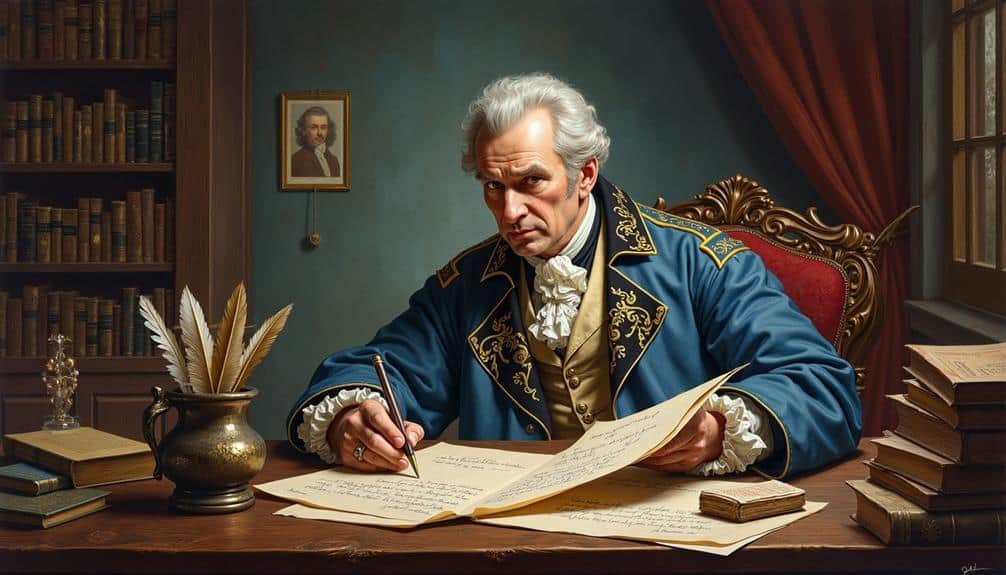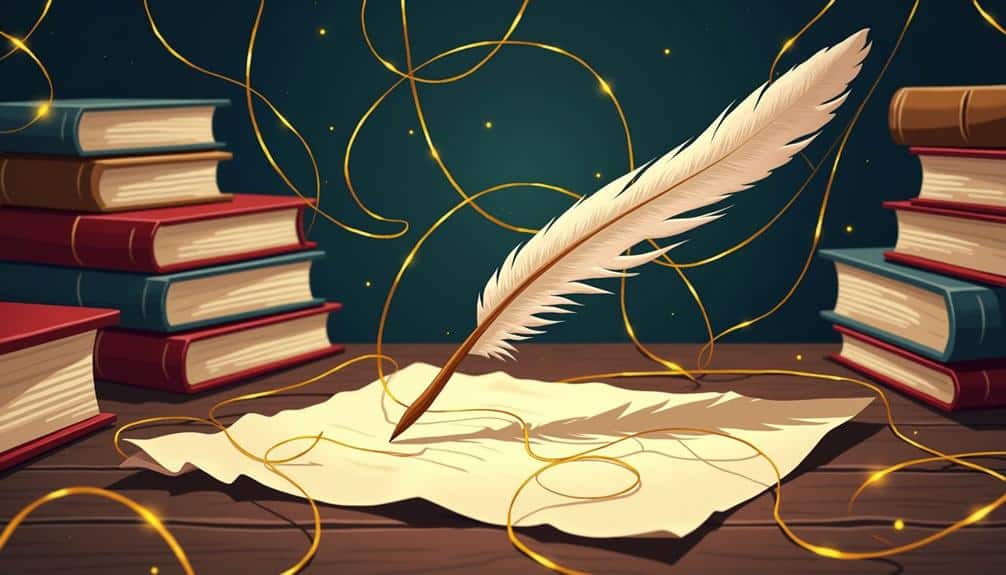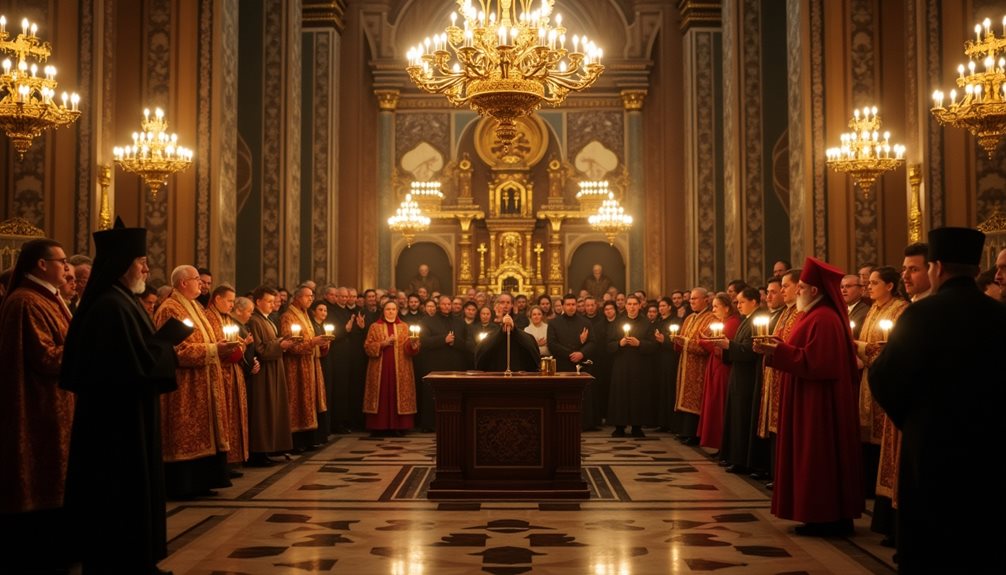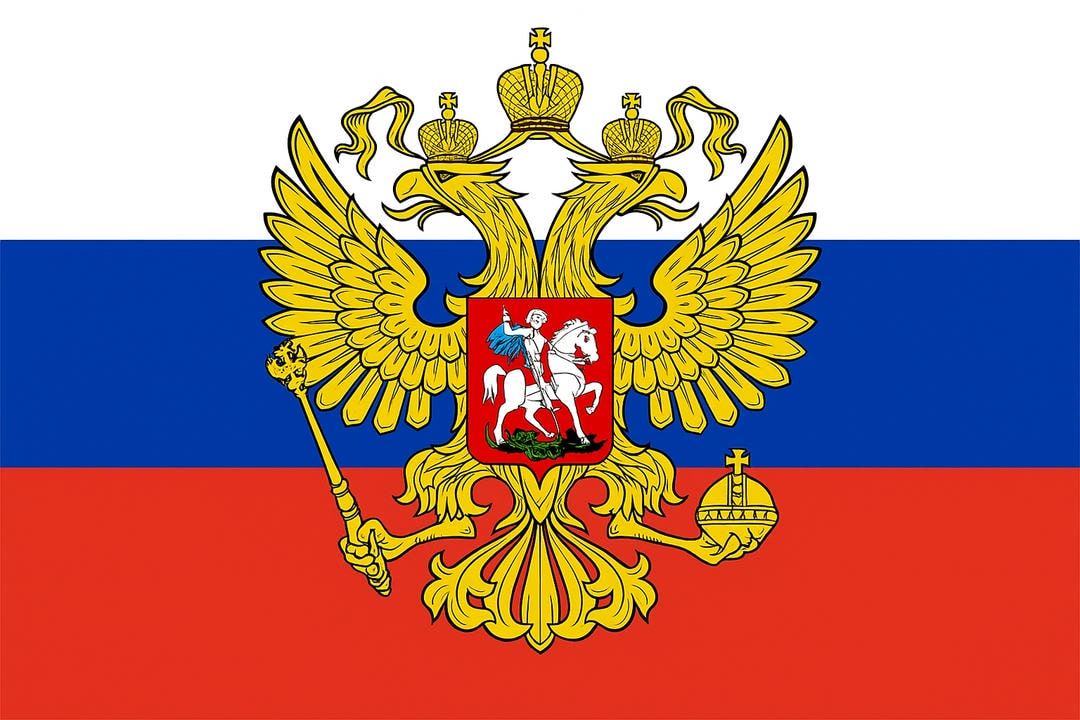When you consider the far-reaching impact of Alexander Pushkin on global literary traditions, you might wonder how one writer could reshape narrative techniques and poetic forms across so many cultures. His innovative use of language and deep emotional resonance didn’t just transform Russian literature; it also inspired movements from European Romanticism to American individualism. But what specific elements of Pushkin’s work have left an indelible mark on writers and artists worldwide? To grasp the full extent of his influence, it’s essential to explore how his themes of love, freedom, and identity continue to shape literary landscapes today.
Pushkin’s Literary Innovations

Pushkin’s literary innovations reshaped the landscape of Russian literature, blending a masterful command of language with groundbreaking narrative techniques. You’ll find his lyrical style particularly striking, as it imbues his works with an emotional resonance that’s hard to ignore. His character development stands out, offering multi-faceted individuals whose complexities reflect the thematic depth of his stories.
When diving into Pushkin’s works, you’ll notice how he deftly incorporates social commentary, weaving it seamlessly into the narrative voice. His stories and poems don’t just entertain; they probe the intricacies of the human condition within the cultural context of his time. This is particularly evident in his use of various poetic forms, which he elevates through structural innovation.
Pushkin was heavily influenced by historical events, and his ability to reflect these influences in his writing provides a rich tapestry of Russian society. His thematic depth isn’t just a product of his imagination but a mirror to the social and political currents of his era.
Global Impact of Pushkin’s Poetry
Few literary figures have had as profound a global impact as Alexander Pushkin. His poetry, rich in symbolism and emotional depth, has transcended linguistic and cultural barriers, fostering a global reception that’s both widespread and deeply appreciative.
Pushkin’s poetic forms, rooted in Russian tradition yet innovative in their execution, have inspired literary dialogues across continents, influencing poets and scholars alike.
Pushkin’s symbolism resonates universally, offering layers of meaning that invite various artistic interpretations. Themes of love, freedom, and human nature in his work create thematic resonances that connect with readers from diverse backgrounds. These themes have sparked cultural exchanges, where Pushkin’s ideas are adapted and reimagined within different literary traditions.
Moreover, the emotional depth of Pushkin’s poetry has a profound impact on the reader, evoking intense feelings and reflections. This emotional resonance ensures that his work remains relevant and powerful, even as it’s translated and interpreted worldwide.
Narrative Techniques Adopted Globally

When examining how narrative techniques have been adopted globally, it’s evident that Alexander Pushkin’s innovative approaches have profoundly influenced storytelling across various cultures. His use of fragmented narratives and nonlinear timelines has paved the way for modernist and postmodernist authors to explore complex structures.
You can see Pushkin’s imprint in the stream of consciousness technique, where characters’ thoughts flow seemingly unfiltered, creating an immersive experience.
Pushkin’s incorporation of unreliable narrators has added layers of depth and ambiguity to character-driven plots, compelling readers to question the veracity of the narrative. His adept use of metafictional techniques blurs the line between fiction and reality, inviting readers to reflect on the nature of storytelling itself.
Additionally, his intertextual storytelling establishes connections between different literary works, enriching the narrative with multiple perspectives.
Pushkin’s poetic prose elevates the aesthetic quality of the text, blending lyrical beauty with narrative depth. His mastery of allegorical storytelling allows for multifaceted interpretations, offering profound insights into human nature and societal issues.
Influence on European Writers
Across Europe, Alexander Pushkin’s literary innovations have left an indelible mark on countless writers. Pushkin’s Romanticism, characterized by its emotional intensity and individualism, resonated deeply with European authors who sought to break free from classical constraints. His exploration of Russian aesthetics provided a fresh perspective that invigorated European Symbolism, particularly through his pioneering use of narrative voice and poetic form.
You can observe Pushkin’s influence in the works of French symbolists like Charles Baudelaire and Stéphane Mallarmé, who admired his ability to weave intricate symbolism with lyrical beauty. This cross-cultural reception facilitated a rich literary intertextuality, where Pushkin’s themes and techniques were seamlessly integrated into European narratives.
Moreover, Pushkin’s influence extended to the German literary scene, impacting writers such as Heinrich Heine and Thomas Mann. They embraced his nuanced characterizations and complex plot structures, further enriching the European literary heritage. By integrating Pushkin’s innovative narrative techniques and thematic depth, these writers contributed to a dynamic literary dialogue that bridged cultural and linguistic divides.
In essence, Pushkin’s legacy in Europe underscores a profound and enduring cross-pollination of literary traditions, reinforcing his position as a cornerstone of global literary heritage.
Pushkin and American Literature

Pushkin’s influence on American literature, though often underappreciated, runs deep and manifests in several key areas. First, consider the narrative techniques employed by American authors. Pushkin’s innovative use of the “superfluous man” archetype resonates in the works of writers like Henry James and F. Scott Fitzgerald. By portraying characters who grapple with existential dilemmas and societal expectations, these authors echo Pushkin’s exploration of individualism and alienation.
Moreover, Pushkin’s American influence is apparent in the thematic elements of moral complexity and the human condition, which are prevalent in American Literary Adaptations of his works. For instance, Edgar Allan Poe’s fascination with the macabre and the psychological can be seen as a reflection of Pushkin’s dark romanticism, especially in stories like “The Queen of Spades.”
Furthermore, Pushkin’s poetic techniques, such as his use of lyrical simplicity and conversational tone, have found their way into the free verse of Walt Whitman and the emotionally charged poetry of Emily Dickinson. These stylistic adaptations highlight how American poets have drawn inspiration from Pushkin’s ability to convey profound emotion with economy of language.
Thus, Pushkin’s legacy in American literature is both subtle and profound, shaping its narrative and thematic landscape.
Asian Literary Responses
Amidst the diverse tapestry of global literature, Alexander Pushkin’s influence extends impressively into Asian literary traditions. When examining Asian adaptations of Pushkin’s work, you uncover a rich interweaving of Pushkin’s symbolism with regional influences. Pushkin’s evocative imagery finds resonance in the poetic structures of Chinese and Japanese literature, where visual metaphors and emotional depth are paramount.
In India, Pushkin’s thematic parallels, such as romantic idealism and societal critique, have been mirrored in works by Rabindranath Tagore and other luminaries, fostering profound literary dialogues. These dialogues illustrate the cultural exchanges that enrich both Pushkin’s legacy and Asian literary canon.
Korean writers, too, have embraced Pushkin’s narrative styles, particularly his fusion of folklore and modernity. This approach aligns seamlessly with Korea’s own literary traditions, which often blend myth with contemporary narratives. Such integration showcases the adaptability and timelessness of Pushkin’s storytelling.
Moreover, Southeast Asian authors have drawn from Pushkin’s themes of exile and identity, weaving them into their unique cultural contexts. The result is a cross-cultural tapestry where Pushkin’s influence is both subtle and transformative, underscoring a dynamic interplay of literary traditions across continents.
Pushkin’s Role in Modernism

The profound impact of Pushkin on Asian literary traditions exemplifies how his narrative genius transcends cultural and geographical boundaries.
Moving forward to Pushkin’s role in Modernism, you must consider both Pushkin’s stylistic evolution and his historical context to grasp his influence fully. Pushkin’s innovative use of language and form laid the groundwork for many modernist techniques. His ability to blend romanticism with realism foreshadowed the fragmentation and multiplicity that later defined Modernist literature.
Within Pushkin’s historical context, he was a pioneer who navigated the tensions between classical forms and emerging contemporary themes. His works, such as “Eugene Onegin,” exhibit a sophisticated interplay of verse and prose, predating the stylistic experimentation of Modernism.
Pushkin’s stylistic evolution, characterized by a shift from strict neoclassical forms to more fluid and versatile structures, directly influenced modernist writers who sought to break away from conventional storytelling.
Translation and Adaptation
When diving into the realm of translation and adaptation, one can’t overlook the transformative journey that Pushkin’s works have undergone across languages and cultures. Translators face significant linguistic challenges in preserving the poetic rhythm and thematic resonance intrinsic to Pushkin’s original texts. His rich use of language and historical context often requires not just literal translation but a nuanced cultural interpretation to maintain authorial intent and literary legacy.
Adaptation styles vary, with some prioritizing translation accuracy, while others focus on capturing the emotional essence of Pushkin’s writing. These cross-cultural exchanges have led to diverse interpretations, reflecting the adaptability of Pushkin’s themes to different cultural landscapes. Scholars often debate the balance between fidelity to the source text and the necessity of making the work accessible and relevant to contemporary audiences.
The historical context of Pushkin’s era, along with his unique authorial voice, poses additional challenges. Translators and adaptors must navigate these complexities to ensure that the spirit of Pushkin’s work isn’t lost in translation.
Thus, the ongoing efforts in translating and adapting Pushkin’s oeuvre continue to enrich his global literary legacy, fostering a deeper appreciation of his contributions to world literature.
Pushkin in Popular Culture

Celebrating Pushkin’s enduring legacy, popular culture has found numerous ways to incorporate his literary genius into modern narratives. Pushkin’s adaptations have permeated various artistic media, prominently in film, where directors and screenwriters strive to capture his complex characters and intricate plots.
You can witness Pushkin’s influence in Russian cinema, where his works, such as “Eugene Onegin” and “The Queen of Spades,” have been translated into compelling visual stories. These adaptations maintain the essence of Pushkin’s original prose and poetry while making them accessible to contemporary audiences.
Beyond Russian borders, Pushkin in film has inspired international filmmakers. For instance, his narrative style and thematic depth are evident in adaptations like the British production of “Onegin” (1999), which stars Ralph Fiennes and Liv Tyler. Such works highlight the universal appeal of Pushkin’s storytelling, bridging cultural and linguistic divides.
Moreover, Pushkin’s adaptations in television, theater, and even animation continue to broaden his reach. By translating Pushkin’s timeless themes and characters into diverse formats, popular culture ensures that his literary contributions remain relevant and influential across generations and geographies.
You can see that Pushkin’s legacy thrives, adapting to the evolving landscape of popular culture.
Enduring Themes in Pushkin’s Works
Examining Pushkin’s enduring themes reveals a tapestry of human experience that transcends time and place. You’ll find that his works delve deeply into universal love, illustrating relationships that resonate with readers across generations.
Pushkin’s exploration of existential questions challenges you to ponder life’s meaning and your own place within it. His nuanced portrayal of cultural identity provides a lens through which you can understand the complexities of Russian society, while also reflecting broader, global themes.
Pushkin’s use of nature imagery evokes a sense of place and emotion, grounding his narratives in the physical world. This imagery not only enhances the aesthetic quality of his work but also serves as a metaphor for internal states and societal conditions.
When it comes to social justice, Pushkin’s writings often critique the inequities of his time, urging you to consider the moral imperatives of fairness and equality. His commitment to artistic freedom, even in the face of censorship, underscores the importance of creative expression.
Pushkin’s personal struggle is woven into his narratives, offering a poignant glimpse into the human condition. Understanding the historical context of his era enriches your appreciation of his work’s depth and enduring relevance.




